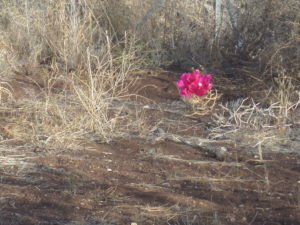Is April the cruellest month? T.S. Eliot seemed to think so.

“April is the cruellest month, breeding/Lilacs out of the dead land, mixing/Memory and desire, stirring/Dull roots with spring rain.”
My father would often quote the first line of this poem, The Wasteland. I could never figure out why. As a child growing up in southeastern Pennsylvania, I thought April was a great month; the arrival of spring. A time to play outdoors, shed my boots and snowsuit, freeing me from the winter house. It was Easter and flowers and egg hunts, and chocolate; the Hallelujah chorus, my new dress and tulips on Easter Sunday. Many years later, Dad explained why that line spoke to him. Both his mother and his father had died in April when he was still young; then, the day before my parents’ 25th anniversary on April 18, my mother died. The cruel irony of April as the first taste of spring and the deaths of three loved ones was not lost on him.
I believe, however, that Eliot had something else in mind when he wrote those lines. As I read them again, I have a sense of what that may be.
I have heard people say that we were slammed by mother nature and by “acts of God.” Actually that’s not it at all. Not acts of God but acts of people piled up year after year, presuming that our planet will just take care of itself and we can keep on doing what we’ve been doing. But we have sowed the wind and we are reaping the whirlwind; planted the seeds of climate destruction and are harvesting the results.
Now, more than a month after the official arrival of spring, things have changed. The redwings have arrived, the crocuses and daffodils are blooming, most of the snow has melted and the pond ice has broken up. Isn’t it wonderful to take a walk and leave our hats and gloves and down jackets behind? Wouldn’t it be easy to believe that, yes, the seasons do, after all, come and go in their natural order?
So while it is tempting to simply rejoice in the warm days and soft twilight, I will try to remember how just a few weeks ago I wondered if spring would ever come. I hope that this memory will keep me aware of our planet’s delicate balance and vulnerability. I hope to remember that I am a steward and not an owner of the earth and to live lightly and mindfully in all the seasons.

I much prefer Chaucer’s April to Eliot’s:
Whan that Aprille with his shoures sote
The droghte of Marche hath perced to the rote,
And bathed every veyne in swich licour,
Of which vertu engendred is the flour;
Whan Zephirus eek with his swete breeth
Inspired hath in every holt and heeth
The tendre croppes, and the yonge sonne
Hath in the Ram his halfe cours y-ronne,
And smale fowles maken melodye,
That slepen al the night with open yë,
(So priketh hem nature in hir corages):
Than longen folk to goon on pilgrimages
(And palmers for to seken straunge strondes)
To ferne halwes, couthe in sondry londes;
And specially, from every shires ende
Of Engelond, to Caunterbury they wende,
The holy blisful martir for to seke,
That hem hath holpen, whan that they were seke.
Ah, Larry, such are the fruits of an old school, anglophilic private school education! I was actually contemplating including the first few lines in my post.
Can you recite it from memory? I get as far as “longen folk to goon on pilgrimages”
How true. I can only get as far as “of which vertu engendred is the flour…” And only the first verse of:
Sumer is icumen in
Lhude sing, cuccu.
Groweth sed and bloweth med
And springth the wude nu.
Sing, cuccu.
My favorite season.
Comments are closed.